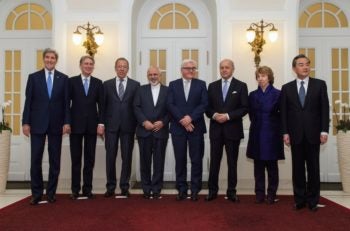(JTA) – Among his rationales for opposing the nuclear deal with Iran, U.S. Sen. Charles Schumer said that he did not trust the three European Union partners to punish Iran should it violate the terms of the accord that offers the Islamic Republic sanctions relief in exchange for scaling back its nuclear activities.
The New York Democrat’s assertion served as a reminder that while Washington has been the driving force behind the deal, which was reached July 14 between Iran and six world powers, the agreement is an international one. Its implementation, therefore, will be determined in part by the foreign policies and interests of Britain, France, Germany, China and Russia.
“It is reasonable to fear that once the Europeans become entangled in lucrative economic relations with Iran, they may well be inclined not to rock the boat by voting to allow inspections” that would bring about renewed sanctions, Schumer wrote in an Aug. 6 statement.
READ: Iran debate devolves with charges of ‘dual loyalty’ and ‘dog whistles’
(Russia and China are unlikely to introduce new obstacles to trade with Iran, judging by their apparent eagerness to sell arms to Tehran. Qasem Soleimani, an Iranian defense official who is still the subject of a United Nations travel ban over his country’s nuclear activities, reportedly traveled to Moscow to discuss, among other matters, the sale of air defense missiles. China, meanwhile, has agreed to provide Iran with 24 fighter jets in exchange for access to Iranian oil fields for the next 20 years, Taiwanese media reports have said.)
Schumer, the highest-ranking Jewish Democrat in the Senate, has said that he would vote against the deal in Congress, where it is expected to fail. President Barack Obama has vowed to veto any bill of disapproval, for which both houses of Congress would need a two-thirds vote to override.
Schumer’s stated concern about the European Union partners echoes warnings by critics of the deal who say that Europe’s fragile economies lack the discipline to cut trade with Iran should it violate the terms of the deal. But European supporters of the agreement argue that Europe has already proven its willingness to cut trade, and that Iran’s economic dealings will work to increase compliance, not diminish it.
“The resumption of an economic cooperation with the West will boost the gradual liberalization of the Iranian regime and allow it to respond to demands for democracy from civil society,” JCall, Europe’s liberal pro-Israel lobby, similar to J Street in the United States, wrote in a statement.
Europe’s recent track record suggests it has the discipline to walk away from Iranian money. When the European Commission first imposed sanctions against Iran in 2007, it cut a booming trade of 25 billion euros (then worth some $42 billion) between Iran and EU member states to around $7 billion last year.

Foreign ministers from the six world powers negotiating with Iran, the European Union and Iran in Vienna, Austria, Nov. 24, 2014. (Wikimedia Commons)
Promoting stricter sanctions against Iran was easier for the United States, whose trade with Tehran — just $318 million in 2007 — is in any case limited by legislation set in place in the 1980s. (U.S. trade with Iran has gradually decreased since then to less than $1 million in imports and $186.5 in exports last year.)
But the economic situation in the European Union has worsened since 2007, with the union having been badly hurt by the global financial crisis the following year and struggling to maintain the integrity of its financial bloc and currency.
European leaders, including German Chancellor Angela Merkel, vowed to renew sanctions if Iran fails to comply. But with two of the three EU partners suffering from stagnant economies and rising unemployment, many share Schumer’s skepticism on whether this will actually happen.
READ: Op-Ed: Lobby hard on the Iran deal, but ditch the stereotypes
“The sanctions are toast,” said Emanuele Ottolenghi of the Foundation for Defense of Democracies, a right-leaning think tank. Britain, France and Germany, he said, “are in no condition, economically speaking, to agree to implement sanctions once they are lifted.”
Even if they agree to lift such sanctions, the deal’s terms mean that such punitive steps would not apply to contracts signed before the sanctions’ re-introduction, Ottolenghi said, noting: “The result is a rush in Europe to sign contracts now, even if they are not immediately applied, just to make them sanctions-proof.”
In 2007, Germany’s gross domestic product grew at a rate of 3.3 percent. It now stands at 0.1 percent. France went from a GDP growth rate of 2.4 percent in 2007 to 0.2 percent in 2014. Of the three EU partners, Britain alone has managed to restore its 2007 growth rate of 2.6 percent after the 2008 crash.
The deal does allow for the reimplementation of sanctions through the U.N. Security Council, even over the objections of other veto players. But doing so, analysts warned, could alienate allies and complicate the creation of a new coalition to impose sanctions — making the snapback option anything but snappy.
But in defense of the deal, J Street has maintained in statements that “the EU and US can snap back their own sanctions at any time if Iran does not meet its commitments.” The left-leaning pro-Israel lobby insisted that the terms of the deal mean sanctions will be snapped back “automatically” at the Security Council if Iran violates any part of the agreement and provided the United States and EU partners demand it.
JTA has documented Jewish history in real-time for over a century. Keep our journalism strong by joining us in supporting independent, award-winning reporting.






